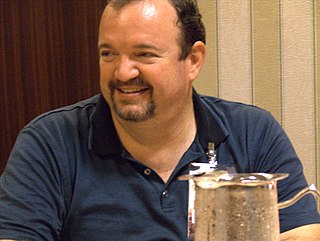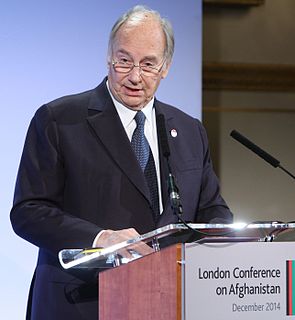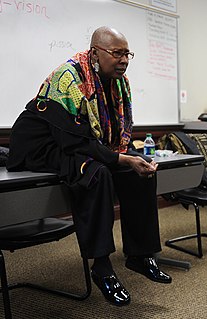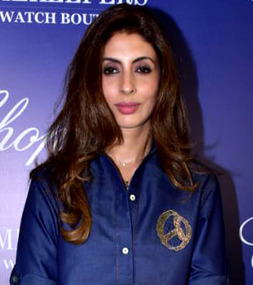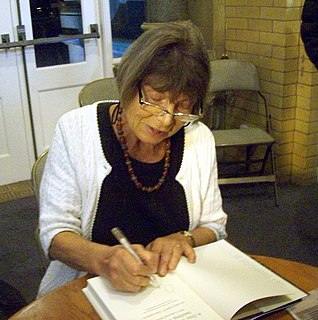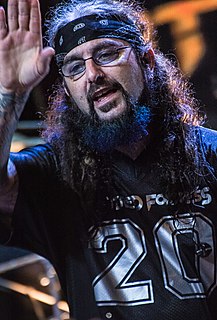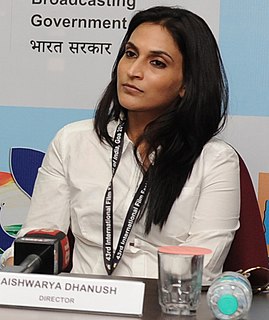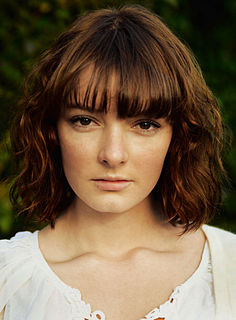A Quote by Tracy Hickman
[A] couple I had known - who were old friends - asked me what I was going to work on next. I told them I wanted to write a near future book about AIDS concentration camps. They were vehement in their response: they thought it was a terrible idea. Their words both shocked and saddened me. "Do you really want to write a book about homosexuals?" they asked me. "Won't people who read your work be influenced toward sin?" I notice that I don't hear from them much lately.
Quote Topics
About
AIDS
Asked
Book
Both
Camps
Concentration
Concentration Camp
Couple
Friends
Future
Going
Going To Work
Had
Hear
Idea
Influenced
Known
Lately
Me
Much
Near
Next
Notice
Old
Old Friend
Old Friends
People
Read
Really
Response
Saddened
Shocked
Sin
Terrible
Them
Thought
Toward
Vehement
Want
Wanted
Were
Words
Work
Write
Your
Related Quotes
The format of the book was the idea of my wonderful editor, Stephen Segal. Stephen and I had worked together before, on projects for the Interstitial Arts Foundation, and when he got the idea for an accordion-style book, he called and asked if I could write the story for it. I told him that I would love to try! And I knew it had to be a love story, because that's the sort of story you really want to hear from both perspectives. I mean, imagine if Pride and Prejudice were told from Darcy's perspective as well as Elizabeth's. It would be quite a different story!
My grandfather was a most gifted person, and amongst his many qualities, one of them had always particularly impressed me. While the past was a book he had read and re-read may times, the future was just one more literary work of art into which he used to pour himself with deep thought and concentration. Innumerable people since his death have told me how he used to read in the future, and this certainly was one of his very great strengths.
Me writing the book and the subsequent interactions that we had were actually the cap on that experience. We were still in this weird purgatory about it when I published the book. When I gave them the galleys and what ensued after that, then I understood a lot more about our relationships and what the experience meant to them. I'd never wanted to know what they thought about it at all.
My wonderful editor, Jackie Onassis, asked me to write a book that I wanted to write. I said, 'Look, it's not going to be scandalized. I'm not going to talk about anybody like a dog. I'm going to say the positiveness of my life, and talk about those who have contributed to the way I've been going, and that's that.'
Write what you want to read. So many people think they need to write a particular kind of book, or imitate a successful style, in order to be published. I've known people who felt they had to model their book on existing blockbusters, or write in a genre that's supposed to be "hot right now" in order to get agents and publishers interested. But if you're writing in a genre you don't like, or modeling yourself on a book you don't respect, it'll show through. You're your first, most important reader, so write the book that reader really wants to read.
I was asked in an interview once: You're writing another book with a female lead? Aren't you afraid you're going to be pigeonholed? And I thought, I write a team superhero book, an uplifting solo hero book, I write a horror-western, and I write a ghost story. What am I gonna be pigeonholed as? Has a man in the history of men ever been asked if he was going to be pigeonholed because he wrote two consecutive books with male leads?
I've always enjoyed stories that take place in the future but my one disappointment was that the future books described never came. We're not on other planets, there are no flying cars, and the only robots we have in our homes just sweep the floor. So I wanted to write about a future that I thought could really happen. People ask me when I tell them the title of the book, 'Are we all dead?' The good news is, no. We're still here. And I even think the future in my book is strangely hopeful, although I'm sure there will be people who strongly disagree.
What really annoys me are the ones who write to say, I am doing your book for my final examinations and could you please tell me what the meaning of it is. I find it just so staggering--that you're supposed to explain the meaning of your book to some total stranger! If I knew what the meanings of my books were, I wouldn't have bothered to write them.
You have to write a book because you believe it has helped you, because you believe it has helped others personally and you are dying to share with it others because you know it will add value to their lives. You write it for them like a gift. You don't want anything from them. You don't want them to do anything for you. You don't even care if they all share the book with their friends, they don't all have to buy them. You're just dying to share this idea with people. Your challenge is to write it in a way that is compelling, enjoyable to read so that they will get the idea.
Someone wanted me to write a profile for ESPN about the commissioner of baseball, and I said, "He's just some suit! Some Republican. No!" I mean if you want me to write about baseball, boxing or football, I'll write about those things because I watch them, I think about them a lot and I like them. But I don't want to write about Barry Bonds.
I've been asked to write a book several times; I've had several publishers come to me and offer me book deals. Especially right after I left Dream Theater and Avenged Sevenfold, there was a lot of drama going on in my life, so the book companies came at me thirsty for blood and gossip. And I turned down all the deals.
I didn't really like reading much before I did 'The Golden Compass'. But then my teacher told me to read it. And I thought, 'Oh God, I'm going to have to read a whole book by myself!' It's not that I couldn't read, it's just that I didn't really like books very much. But the book that she lent me I really enjoyed.
